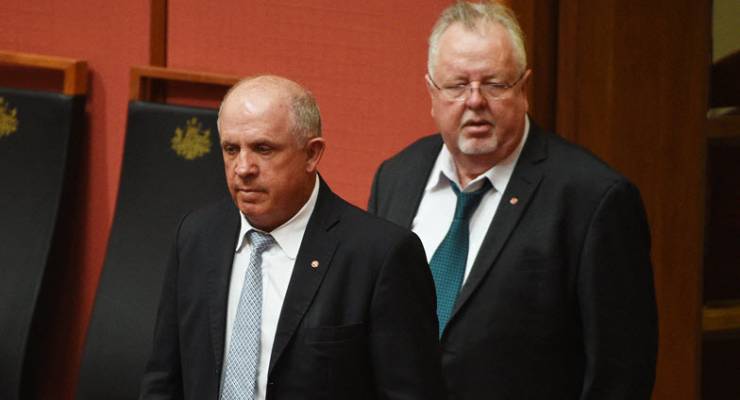
Nationals Senators John Williams and Barry O’Sullivan
Malcolm Turnbull, former banker and successful businessman, has never quite understood the deep antipathy toward banks that lurks in the electorate. And understandably. For Turnbull, banks have always been sources of capital, venture partners, employers, client, occasional disputants. The relationship between a businessman as smart and successful as Turnbull and banking is very different to one that most of us have.
May 13, last year. Windsor RSL in Sydney’s west. The first leaders’ debate. Malcolm Turnbull wanted to convey to the audience present just how risky was Bill Shorten’s idea for a banking royal commission.
“What Bill is proposing, as he said, in an article he had in the Telegraph, the other day… he said… in his heading, he said ‘time to put the banks in the dock’ – now, the dock is where the criminal stands, the accused person stands, in a criminal trial, so here you’ve got Bill, who wants to be Prime Minister of Australia, who says you should line the banks up as though they’re accused of a crime, as though they’re all criminals.”
Rather than shuddering in fear at the enormity of what Shorten was proposing, however, the audience cheered and clapped, throwing the Prime Minister off. “Well, let me just say to you, let me just say to you, you want to be careful, you want to be very careful, we need to be very careful what we wish for, here,” he then lectured the audience.
Turnbull didn’t get, and maybe still doesn’t, that a huge number of voters, especially in regional areas, think the banks are indeed all criminals. And the constant succession of scandals and alleged crimes revealed since May 2016 have only served to confirm that. That’s why, no matter how many mechanisms, processes, additional regulations and taxes he puts on the banks, they’ll never be enough for voters. For the latter, it’s like being told a criminal is being subjected to strict control of his behaviour, but without ever serving a day in jail.
So now he stands on the brink of a massive defeat on the issue at the hands of the Nationals, who want to reclaim the mantle of the party that stands up for regional communities against banks. Nats like John Williams have been busting a gut on this issue since long before Labor embraced the idea of a royal commission. But he and his colleagues have had to stand back while One Nation swanned in and were given, with the Liberals’ blessing, a Senate inquiry into lending to primary production customers. The inquiry, chaired by now-dumped conspiracy theorist Malcolm Roberts, has at times been farcical, with Williams publicly expressing his frustration at the antics of Roberts and the lunatic fringe. Forget revenge for the marriage equality bill, a banking inquiry will be revenge for a few other things as well.
There is no way that this doesn’t turn out badly for Turnbull. But there is bad and there is worse. The bad option is accepting Barry O’Sullivan’s invitation to take over the inquiry legislation and owning and controlling it. The worse option is give a very vivid display that Turnbull is in office but not in power.








Turnbull is about as far out of touch with the common man, as it’s humanly possible to be.
As well as the gripes set out in the article, regional people have also experienced the closure of bank branches in small towns over the years. They have long memories.
I agree, regrettably, with toxic Talcum that a banks RC would be a waste of time – the terms of reference would ensure that – but what would count as a good finding?
While we’re waiting, and waiting, and wearying, how about a little competition, a no-frills, government backed bank offering personal loans/mortgages and decent deposit rates, accessed at any post office.
Oh, of course, fewer & fewer post offices. Pity that we don’t have a functioning nation wide net.
The terms of reference are the big elephant not really being mentioned. LNP has form (AWB RC comes to mind), and no doubt Turnbull will eventually stitch this one up.
Hey! Talkbull has to keep his job options open with the banks.
It looks like he’s going to need something soonish.
Who would have thunk it that a multi, multi millionaire, and former corporate banker, would somehow struggle to relate to the average Aussie voter?
Not me, he’s as dinki di as a bottle of 1996 Bollinger Vieilles Vigne Francaise Blanc de Noirs.
Yes, this is exactly how democracy works in late capitalism.
To be fair, you put a bridle on a horse to get it to go where you want : better than Labor doing it – who knows what embarrassing slippery slope rocks that could turn over?